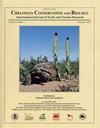Incidence of Botfly Infestation in the Ornate Box Turtle (Terrapene ornata)
IF 0.8
4区 生物学
Q3 ZOOLOGY
引用次数: 0
Abstract
Infestation of Ornate Box Turtles (Terrapene ornata) by sarcophagid botflies was studied over 38 yrs in western Nebraska. At least 2% of captured individuals were infected, primarily in late spring following warm temperatures in the previous September. Botflies may be a significant cause of mortality in box turtles in some years.
华丽盒龟(Terrapene ornata)的螨虫感染率
在内布拉斯加州西部,研究人员历时 38 年研究了肉毒蝇对华丽盒龟(Terrapene ornata)的侵扰。捕获的个体中至少有 2% 受到感染,主要是在前一年 9 月气温升高之后的春末。在某些年份,肉蝇可能是造成盒龟死亡的重要原因。
本文章由计算机程序翻译,如有差异,请以英文原文为准。
求助全文
约1分钟内获得全文
求助全文
来源期刊
CiteScore
1.70
自引率
14.30%
发文量
17
审稿时长
>12 weeks
期刊介绍:
Chelonian Conservation and Biology is a biannual peer-reviewed journal of cosmopolitan and broad-based coverage of all aspects of conservation and biology of all chelonians, including freshwater turtles, marine turtles, and tortoises. Manuscripts may cover any aspects of turtle and tortoise research, with a preference for conservation or biology. Manuscripts dealing with conservation biology, systematic relationships, chelonian diversity, geographic distribution, natural history, ecology, reproduction, morphology and natural variation, population status, husbandry, community conservation initiatives, and human exploitation or conservation management issues are of special interest.

 求助内容:
求助内容: 应助结果提醒方式:
应助结果提醒方式:


